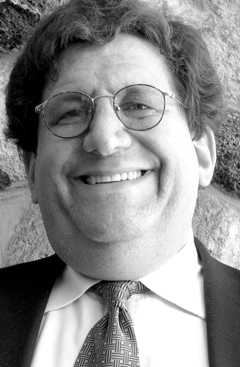Rabbi takes new pulpit, hopes to find job as a hospital chaplain in his native Pittsburgh
By MORDECAI SPECKTOR
Rabbi Jonathan Perlman, who had been living in St. Louis Park, led Rosh Hashana services again this year. However, it was not at Temple Sholom in Eau Claire, Wisc., but at New Light Congregation, a Conservative shul in Pittsburgh, Penn.
Perlman was the director of the Robert and Janet Sabes Center for Jewish Arts and Humanities at the Sabes JCC from 2007 to 2008. Following the retirement of Rabbi Yosi Gordon, he took over the part-time pulpit position at Temple Sholom. Most recently, Perlman was a chaplain resident at Abbott Northwestern Hospital in Minneapolis.
There are two chaplains on staff at the sprawling hospital in the Phillips neighborhood of South Minneapolis, Perlman said, during a recent interview at the AJW offices. He noted that Abbott “really depends on the [chaplain] residents and the interns,” with the latter group selected from those enrolled in the clinical pastoral education program. Perlman was enrolled in the program from February to May 2009, before becoming a resident.

Comprising the corps of chaplain residents were a male African-American pastor, a Catholic laywoman, a female Lutheran pastor from Iowa, “and then I was the Jew,” Perlman explained. Later, a Norwegian chaplain joined the other spiritual counselors at Abbott.
“It was a fantastic year,” Perlman said. Half of the time was spent in seminars, “cultivating our professional skills and also working on theology.” The remaining time was devoted to clinical work; Perlman worked with neurologists and counseled patients suffering from anxiety or rehabbing from traumatic brain injuries. He concerned himself with patients’ “soulful issues.”
The personable rabbi mentioned counseling a client who was found to have a brain tumor the size of a baseball; the man was told that it was malignant and he had six months to live.
“I dealt with people with seizures; I also dealt with stroke patients,” said Perlman, who also is a graduate of Yale University and Jewish Theological Seminary.
The rabbi’s clients coped with their grave problems in various ways. “Some people are in denial about the illness; they won’t cry, they want to be stoic,” he commented. “Some people break down.” Others, according to Perlman, have no faith and “see all the horrors in the world,” and a God who does not intervene to help humanity — they exist in a spiritual “vacuum.”
Perlman served as the chaplain for many Christians; he said only two rejected him and expressed their preference for a Christian minister. The more common experience was acceptance, with Christians requesting that Perlman assist them as a pastor.
The rabbi remarked: “It really opened me up to a new aspect of myself: I was profoundly moved by the experiences of people in crisis, and working with them and being able to help them solve problems sometimes — also, being an agent for hope, being able to try to get them to feel more positively about getting through their illness.”
Perlman said that his work as a chaplain resident was “very enriching… the education that I got out of it was just tremendous, in terms of stretching my own soul.”
He said that his colleagues, and a supervisor, would “challenge each other in the seminar room over what we were doing with patients.” The group critique would bring out how aspects of the chaplains’ interactions with patients could be improved.
During his time at Abbott, Perlman said, he was in discussions with Jewish Family and Children’s Service of Minneapolis about creating a “community Jewish chaplain position.” He thought that he could help raise funds and use his training in such a role, but the talks did not bear fruit.
The economic doldrums are felt in all sectors, including the synagogue world; it’s a tough job market for rabbis. Perlman, his wife, Beth Kissileff Perlman, and their daughters, Tova, Yael and Ada, will live in a small apartment on the third floor of Perlman’s mother’s house in Pittsburgh. His pulpit position is part-time, and he will be searching for a job as a hospital chaplain.
However, old friends will be on hand to welcome back Perlman to Pittsburgh.
“I am very excited to come back,” he recently told the Jewish Chronicle in Pittsburgh. “I have not been here since I graduated high school.”
(American Jewish World, 9.17.10)




















Comments 1